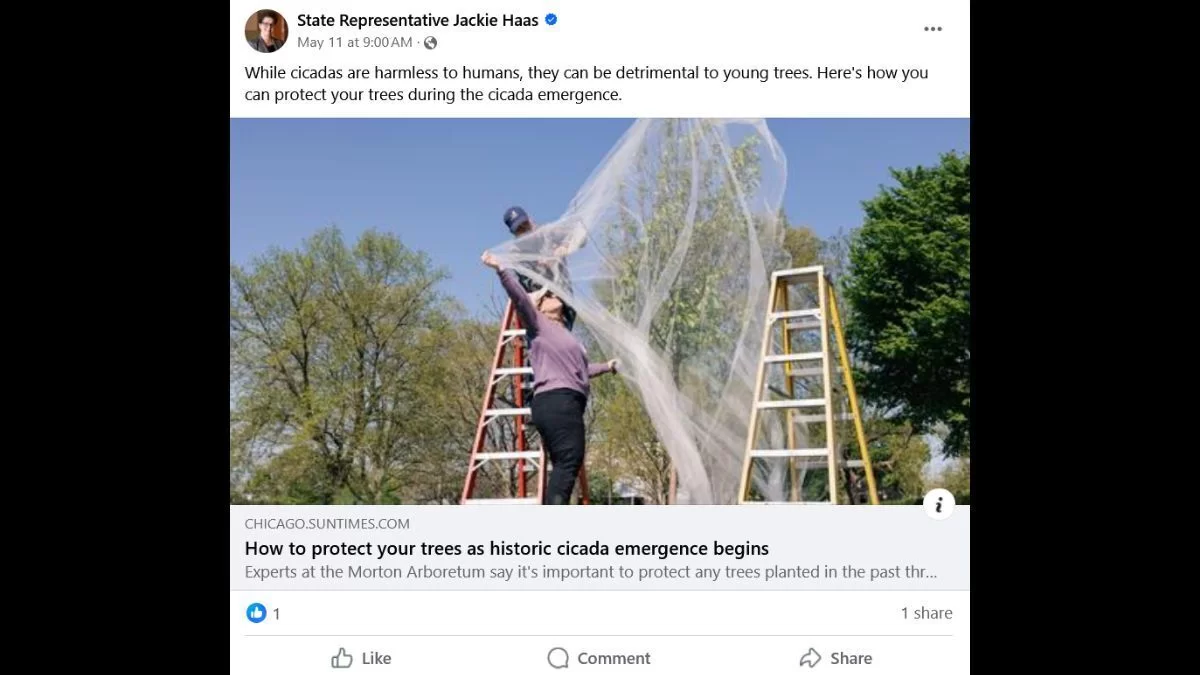Jackie Haas | RepHaas.com
Jackie Haas | RepHaas.com
Jackie Haas, State Representative of Illinois House District 79, recently expressed concern over the potential harm cicadas could cause to young trees. "While cicadas are harmless to humans, they can be detrimental to young trees," Haas said. The representative, who is due to face Democrat William Morgan in the general election, provided information on how homeowners can safeguard their trees.
"While cicadas are harmless to humans, they can be detrimental to young trees," said Haas, according to Facebook.
According to a May 8 report from CBS News, two broods of cicadas may emerge this year both around the state and nationwide. These two breeds surface at distinct intervals - one every 17 years and another slightly earlier, every 13 years. Ken Johnson, a horticulture educator at the University of Illinois, informed CBS News that these insects might appear sometime this month or in early June, contingent on location and soil temperatures.

Screenshot of Rep. Jackie Haas' May 11 Facebook post
| Rep. Jackie Haas' Facebook post
Periodical cicadas typically live for a month after females lay between 500 to 600 eggs. Males commence singing within five days of emergence while females indicate their readiness to mate within the same timeframe.
Haas directed attention towards a Chicago Sun-Times article that highlighted tree protection. Cicadas impact trees as female cicadas lay their eggs on branches and these eggs subsequently fall to the ground. Trees planted within the last three years may be particularly susceptible to female cicadas laying eggs; however, protecting these trees is not an arduous process.
Experts from the Morton Arboretum suggest covering two- to three-year-old trees with fine mesh protective netting can prevent significant damage. According to a Chicago Sun-Times article, hundreds of trees at the arboretum will be netted this spring for protection.
The Morton Arboretum further noted that cicadas mate in various types of trees and even some shrubs. "The insects are known to lay eggs in oak, maple, hickory, apple, birch, dogwood, linden, willow, elm, ginkgo, and pear trees. Cicadas also may lay eggs in some shrubs, such as rose, lilac, and forsythia. According to Arboretum records, during the last emergence 17 years ago some of the plants most affected were maples, cherries, ashes, hawthorns, willows, mountain ashes, oaks, pears, roses, privets, poplars, serviceberries, and beeches," stated the Arboretum on a frequently asked questions web page focused on cicadas and trees.
Rep. Haas was elected to represent Illinois’ 79th House District in December 2020. She is currently the CEO of the Helen Wheeler Center for Community Health; she previously worked as a social worker at Riverside Medical Center. Haas holds a Bachelor of Social Work from Valparaiso University and a Master of Social Work from the University of Illinois-Chicago according to her biography from the Illinois General Assembly.






 Alerts Sign-up
Alerts Sign-up